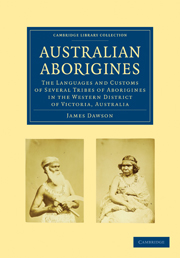 Australian Aborigines
Australian Aborigines Book contents
- Frontmatter
- PREFACE
- INTRODUCTORY NOTE
- Contents
- YARRUUN PARPUR TARNEEN
- CHAPTER I TRIBES
- CHAPTER II POPULATION
- CHAPTER III CHIEFS
- CHAPTER IV PROPERTY
- CHAPTER V CLOTHING
- CHAPTER VI HABITATIONS
- CHAPTER VII CLEANLINESS
- CHAPTER VIII DOMESTIC FURNITURE
- CHAPTER IX COOKING AND FOOD
- CHAPTER X TOOLS
- CHAPTER XI LAWS OF MARRIAGE
- CHAPTER XII CHILDREN
- CHAPTER XIII NAMES OF PERSONS
- CHAPTER XIV SUPERSTITIONS AND DISEASES
- CHAPTER XV DEATH AND BURIAL
- CHAPTER XVI AVENGING OF DEATH
- CHAPTER XVII GREAT MEETINGS
- CHAPTER XVIII AMUSEMENTS
- CHAPTER XIX WEAPONS
- CHAPTER XX ANIMALS
- CHAPTER XXI METEOROLOGY, ASTRONOMY, ETC
- CHAPTER XXII NATIVE MOUNDS
- CHAPTER XXIII ANECDOTES
- CONVEYANCE, BY PRINCIPAL CHIEFS TO JOHN BATMAN, OF 100,000 ACRES OF LAND, BETWEEN GEELONG AND QUEENSCLIFF
- VOCABULARIES.—WORDS; ANIMALS; RELATIONSHIPS; NAMES OF PLACES; GRAMMAR AND SENTENCES; NUMERALS
- NOTES
CHAPTER XII - CHILDREN
Published online by Cambridge University Press: 07 September 2010
- Frontmatter
- PREFACE
- INTRODUCTORY NOTE
- Contents
- YARRUUN PARPUR TARNEEN
- CHAPTER I TRIBES
- CHAPTER II POPULATION
- CHAPTER III CHIEFS
- CHAPTER IV PROPERTY
- CHAPTER V CLOTHING
- CHAPTER VI HABITATIONS
- CHAPTER VII CLEANLINESS
- CHAPTER VIII DOMESTIC FURNITURE
- CHAPTER IX COOKING AND FOOD
- CHAPTER X TOOLS
- CHAPTER XI LAWS OF MARRIAGE
- CHAPTER XII CHILDREN
- CHAPTER XIII NAMES OF PERSONS
- CHAPTER XIV SUPERSTITIONS AND DISEASES
- CHAPTER XV DEATH AND BURIAL
- CHAPTER XVI AVENGING OF DEATH
- CHAPTER XVII GREAT MEETINGS
- CHAPTER XVIII AMUSEMENTS
- CHAPTER XIX WEAPONS
- CHAPTER XX ANIMALS
- CHAPTER XXI METEOROLOGY, ASTRONOMY, ETC
- CHAPTER XXII NATIVE MOUNDS
- CHAPTER XXIII ANECDOTES
- CONVEYANCE, BY PRINCIPAL CHIEFS TO JOHN BATMAN, OF 100,000 ACRES OF LAND, BETWEEN GEELONG AND QUEENSCLIFF
- VOCABULARIES.—WORDS; ANIMALS; RELATIONSHIPS; NAMES OF PLACES; GRAMMAR AND SENTENCES; NUMERALS
- NOTES
Summary
A woman near her confinement is called a ‘moægorm,’ and must stay at home, in her husband's wuurn, as much as possible. When she has occasion to quit the wuurn, any person who meets her must leave the path, and keep away from her.
During her confinement her husband lives elsewhere; the neighbouring wuurns are temporarily deserted; and everyone is sent away from the vicinity except two married women, who stay with her. Should she not have a mother to attend on her, a professional woman, ‘gneein’—two of whom are generally attached to each tribe—is sent for, and compelled to nurse her and the baby till she is able to attend to it, and to resume the performance of her domestic duties. In return for these services the nurse is kindly treated and well fed, and generally presented with an opossum rug. The sick woman is not assisted in any way, and everything is left to nature. She is allowed very little solid food for some time, and only tepid water to drink; and, if necessary, is kept warm with hot stones. The women rarely die in childbirth.
When newly born an infant is not black, and the dark colour appears first on the brow, and spreads gradually over the body. The child is not bandaged in any way, but laid before the fire on soft, dry grass, and afterwards wrapped in an opossum rug. It receives no nourishment of any kind for twenty-four hours, and no medicine.
- Type
- Chapter
- Information
- Australian AboriginesThe Languages and Customs of Several Tribes of Aborigines in the Western District of Victoria, Australia, pp. 38 - 40Publisher: Cambridge University PressPrint publication year: 2009First published in: 1881


